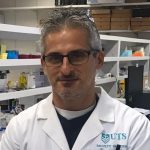Multiple sclerosis (MS) is a complex autoimmune and neurodegenerative disease with no clear cause and no known cure. People with MS indicate that new treatments to protect and repair the brain and spinal cord is their greatest unmet need.
Professor Kaylene Young leads a multidisciplinary team of laboratory scientists, clinicians, biostatisticians, epidemiologists, geneticists, MS advocates and people living with MS, representing diverse experiences and vital perspectives to bridge the gap between MS research and practice. Their goal is to carry out laboratory research to identify signalling pathways that lead to the development of MS, learn how brain circuit function is impacted by MS, and design and translate treatments to protect and repair the brain. For this project:
Over the past year, Professor Young and her team has recruited more than 100 people with MS into their phase II trial to examine the effects of transcranial magnetic stimulation (TMS) on MS symptoms and MRI brain scans. So far, they have found that low intensity TMS is safe for people with TMS. They have also carried out a preclinical study that found changes in nerves following myelin loss made the nerves more sensitive to stimulation and that too much stimulation can cause the nerve cell to die. This may explain how myelin loss leads to loss of nerve cells and the progression MS. Additionally, the team found that remyelination reversed this effect, returning the nerve cells to “normal. Thus, myelin repair treatments could potentially restore impulse conduction to nerves and fix the way the network is wired.
Genes play a role in MS development and severity. Professor Young and her team found that some gene changes change the function of brain cells. This suggests that brain cells themselves are part of the problem and they should be a key target for disease modifying therapies.
Over the next 12 months, Professor Young and her team will complete the phase II trial of TMS and analyse the data. They will also complete imaging of neurons in the brain during demyelination and remyelination and continue their analysis of a laboratory model to understand what gene variations do to different cell types and how they can influence MS disease processes.
Updated 31 March 2024
$650,000
2022
5 years
Current project




